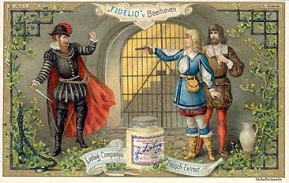


Carmen, by Bizet, was one of the first operas that I ever watched, so it’s no surprise that the titular character is on my list of favorite female characters. When Carmen premiered in 1875, it was considered very vulgar and scandalous. Carmen herself is headstrong and sexy, and changes lovers as often as I eat breakfast. In the end, this is her downfall, since somebody didn’t give the heads up to Don Jose that Carmen was not monogamous. In today’s culture of punishing women for promiscuous sexual activity, she would be condemned as a slut. However, her motives are to simply be free of any connections (after all, she is a gypsy) and do as she pleases. In a time where women were (and still are) expected to get married and settle down, she stands out as someone who bucks tradition and doesn’t care what others think of her.



Fidelio by Beethoven is not always hailed as the best opera. However, the titular character, Fidelio (actually Leonore) is one of my favorite opera characters. Basically, she disguises herself as a man to rescue her husband, who has been wrongfully imprisoned for several years. Throughout the course of the opera, she assists the jailkeeper and his daughter (who develops a very large crush on Fidelio), and finds her husband, still alive. She rescues him and turns the evil man who arrested him over to the authorities. What strikes me about Fidelio is her bravery and hope. She doesn’t even truly know how she’s going to get Florestan (her husband) out of jail, or even if he’s still alive, but she is going to try anyways. Also, she is very adept at hiding her personality and identity in an unfamiliar situation, doing unfamiliar work. She probably wore pretty dresses and pearls when she was at home, but is very comfortable carrying heavy objects and pointing a gun at the villain (one of my favorite opera moments ever). The duo has a great marriage, in which both parties seem to be equal to each other, and care about each other deeply. I’d bet that after the end of the opera, Florestan is damn glad that he married such a wonderful woman.



Faust, by Gounod, is different from my other opera picks because it does not feature a gun-toting, confident protagonist. The main female character, Marguerite, is what one could call “weak”, “naive”, “impressionable”, and “stupid”. She’s a very sweet, deeply religious girl who is at first frightened by Faust’s passionate advances, but then comes to accept him. But, I’m pretty sure the whole “Don’t have sex, you will get pregnant and die” thing might come from the story of Marguerite. We all have heard the stories about single, teen moms who make bad decisions. Well, Marguerite was the first cautionary tale. However, her redeeming quality is that she recognizes her mistake when she’s in hell; she rejects Faust (and the devil)’s offer of salvation and help, seeing them as they truly are. In rejecting them, she ascends to heaven on her own. At one point in our lives, we were all Marguerites: flattered by any romantic attention given to us, easily swayed by lavish gifts over simple declarations (poor Siebel), vain characters, not knowing what we really want, and unable to see our friends for who they truly are.



Brunnhilde, from Wagner’s Ring Cycle, is actually the origin of the whole “fat lady in armor screaming at the top of her lungs” trope that non-opera watchers believe in. However, she is a rich character who is instrumental to the plot, and ends up fulfilling the Rheingold’s destiny. Wotan, her father, tries to make his sons into free heroes, but fails, and it is ultimately Brunnhilde, whom he casts away, that completes the task of returning the Rheingold to the maidens. Her betrayal of Wotan actually is best described as her performing the actions that her father, bound by his spear and his wife, cannot. Wotan first instructs her to save Sieglinde and Siegmund, but then rescinds those orders, and tells her not to interfere. She chooses the first option because of her compassion and understanding, and is punished by her father by being put into an eternal sleep and surrounded by fire, so that only a hero can save her and make her his wife. When that turns out to be Siegfried (Siegmund and Sieglinde’s son, and Wotan’s grandson), she helps him. When he dies, she is entrusted with the Ring, and casts it back into the Rhine, then jumps into Siegfried’s funeral pyre as the Gods burn in Valhalla. She is a constant role model for me of bravery and free will, as well as power and sexuality.
Honorable mention: Sieglinde
Live Long and Prosper
~Chloe

